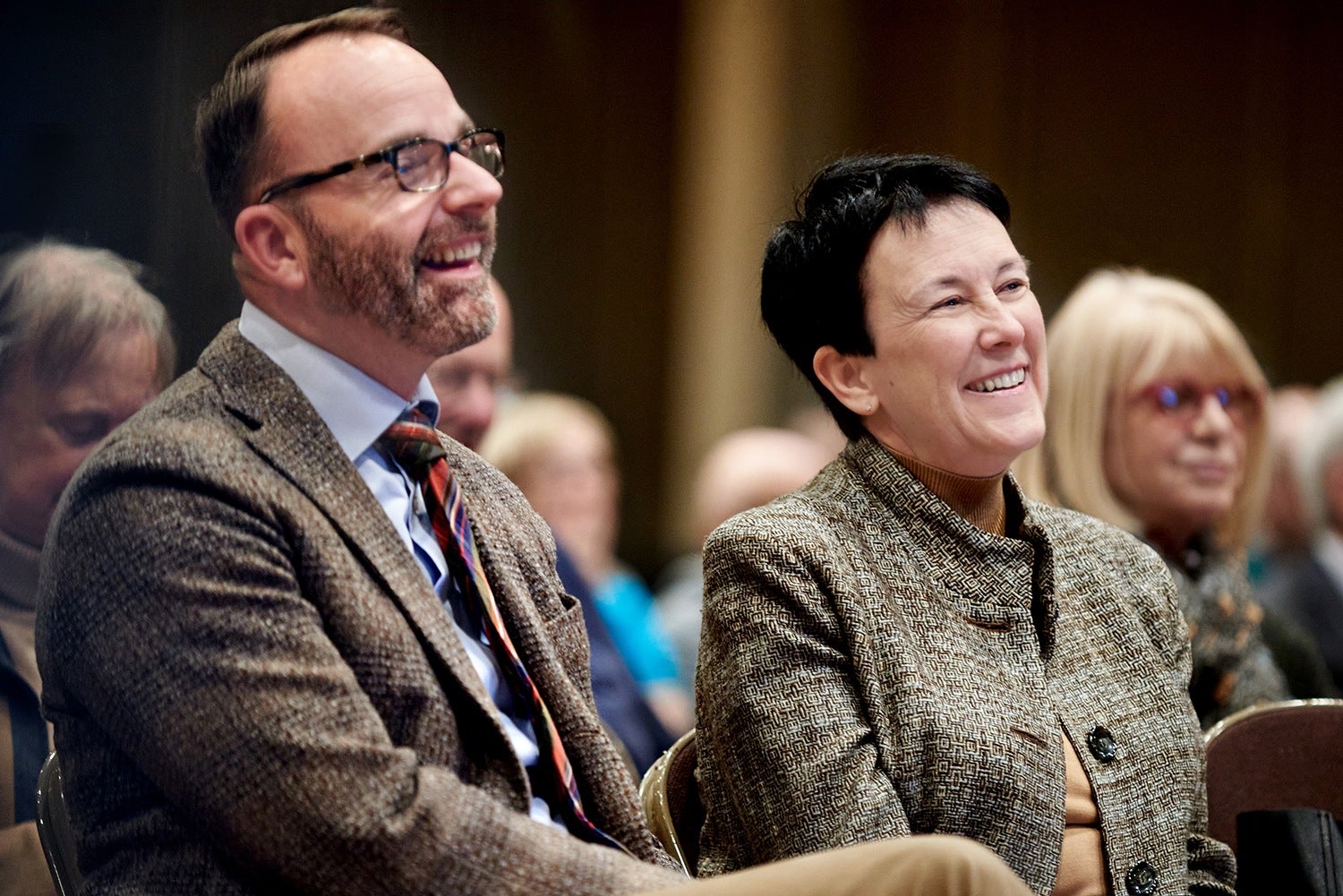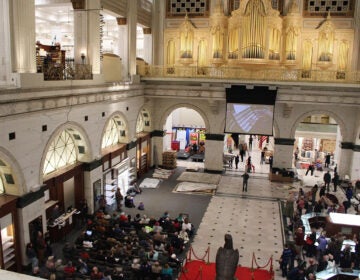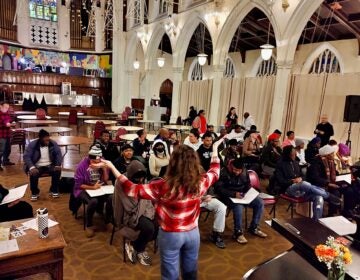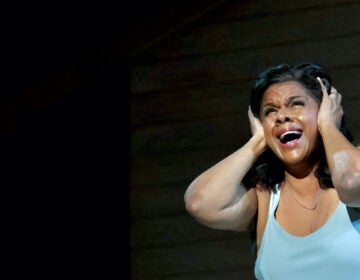Opera Philadelphia opens next season with a real-life art heist
The 2020-2021 season will open with a new chamber opera about a major 2012 art heist at the Kunsthal Museum in Rotterdam.
Listen 2:00
Opera Philadelphia General Director David Devan and Pulitzer Prize winning composer Jennifer Higdon. (Emma Lee/WHYY)
In 2012, seven paintings were brazenly stolen from a museum in the Netherlands, including works by Picasso, Matisse, Monet, Paul Gauguin, and Lucian Freud. The next year, the thieves were arrested, but the paintings were never recovered.
In Romania, the mother of one of the thieves initially told investigators she burned the paintings to protect her son from possible prosecution. She later recanted that claim, but the fate of the paintings is still not known. They may be destroyed, they may be hiding, or they may be circulating in a criminal underworld.
The crime and its aftermath stuck in the mind of composer Jennifer Higdon: What is the value of art to an individual? Does that value supersede the value of family, even if that family is criminal?
In her mind, the incident became a soup of cultural ethics, laws of society, and individual morality.
“What is the value of art in society and to humanity? What happens when you steal it, or remove it?” Higdon asked. “Especially if they are famous, is it more a crime if they are known artists?”

The Philadelphia-based, Pulitzer-winning composer has written a chamber opera based on the art heist and its aftermath. It gets its name, “Woman With Eyes Closed,” from the title of the Lucian Freud painting that was stolen.
The opera, commissioned by Opera Philadelphia, will premiere in the fall during its O20 Festival, Sept. 17 – 26, opening the 2020-2021 season.
Higdon says the action of the performance includes the actual heist — the Kunsthal Museum was criticized for its allegedly lax security measures — but mostly the production follows the development of the characters in the aftermath of the crime.
An inspector is tracking the thieves and trying to figure out why they did it. The curator is grieving the loss of something that had assumed huge professional value.
The mother of the thief emerges as the central character. She must decide whether the paintings are worth more than her son’s freedom.
“Opera is interesting if it is about people,” Higdon said. “It’s not about the pieces of art, although they are central, it’s about the people and how they react to art, what they value and what they don’t value.”
To prepare to write the opera, Higdon took a drawing class at the Pennsylvania Academy of the Fine Arts. It was something of a return to art. She grew up the daughter of a commercial artist who dabbled in abstract painting. Higdon’s youth was steeped in visual art.
“In fact, my family thought I was the odd kid out as a teenager when I started getting interested in classical music,” she said. “I was the black sheep.”
“Woman With Eyes Closed” is Higdon’s second opera. Her first, “Cold Mountain,” based on the 1997 Charles Frazier novel, was also an Opera Philadelphia co-commission that premiered in 2015. For that work, Higdon drew on her memories of growing up in Tennessee near the Appalachian mountains and channeled music and sounds of the post-Civil War era.
This new work, apropos of its subject, is more modern. Higdon said the music uses extended techniques, which push the musicians to play their instruments in ways they are not designed.
“The pianist reaches inside the piano and puts their hand on the strings,” she said. “It’s a more contemporary feel, and gives me a wider color palette.”
While “Cold Mountain” stretched out with a full orchestra, “Woman With Eyes Closed” is a chamber opera, with just 12 instruments and five singers.
The smaller production was baked into the original commission. After the success of “Cold Mountain,” the president of Opera Philadelphia, David Devan, approached Higdon to make something new, at a more modest scale.
“I had this question: if you were to have chamber resources, do you feel any artistic impulses?” Devan said. “She immediately jumped at it, and said, ‘Yes, I actually hear music in my head as you’re speaking!’”
Devan said that although the new opera is based on recent events, it is not an operatic documentary. The characters are largely invented, and the drama crafted artfully.
“We’re not chasing headlines here,” he said. “We’re developing an opera that will live in the canon and be performed for generations. It has a beauty and excitement on its own.”

The O20 Festival will also include a full-scale production of Giuseppe Verdi’s “Macbeth,” directed by Paul Curran, who Devan said offers a modern take on the Shakespearean drama with the presence of omniscient surveillance technology.
The festival will also feature the German opera “El Cimarrón” (The Runaway Slave) by Hans Werner Henze, based on the memoirs of Esteban Montejo. The piece was written in 1970 in a post-modern style, with just three musicians and one baritone. In this case, the baritone will be Sir Willard White.
Devan said Opera Philadelphia has been trying to stage El Cimarrón for at least 10 years.
“We hadn’t found the right person”, he said. “It has to be an artist of highest caliber, has to be African American, and they had to have lived a life. It’s not for a young singer.”
Jamaican-born White is a celebrated bass-baritone who has been performing for nearly 50 years. He is also familiar with El Cimarrón, having performed it for the Royal Danish Opera in 2009. Opera Philadelphia’s production will be performed during the O20 Festival in the atrium lobby of the Barnes Foundation.
WHYY is your source for fact-based, in-depth journalism and information. As a nonprofit organization, we rely on financial support from readers like you. Please give today.





